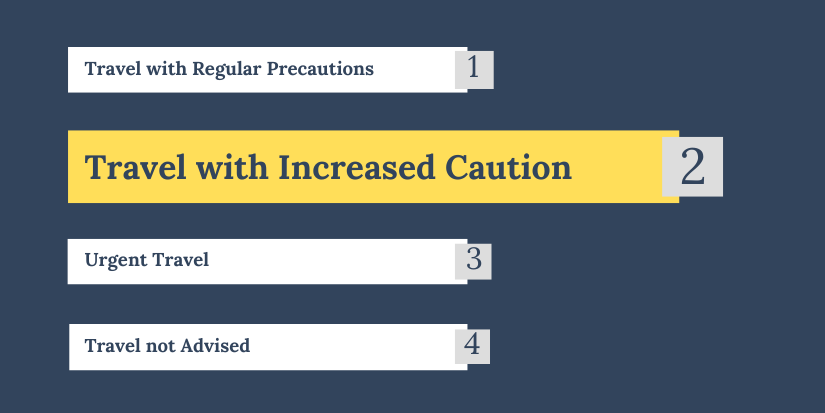
VISA REGIME
For holders of national passports and other travel documents: Visa required
For holders of diplomatic and official passports: Visa is not required for a stay of up to 30 days
Note: Holders of an emergency travel document in transit require a visa, unless they leave the international airport zone
ENTERING AND LEAVING THE COUNTRY
Citizens of the Republic of Serbia are required to obtain a visa for travel to the Republic of Indonesia. The visa can be obtained upon arrival at the airport (known as Visa On Arrival). The fee for this visa is 35 US dollars, and the visa is valid for 30 days (extension of stay is possible but only with the consent of local immigration authorities). More information can be found at the following link: https://www.kemlu.go.id/belgrade/en/pages/kunjungan_saat_kedataangan/36….
The government of Indonesia has implemented the All Indonesia digital platform for mandatory registration of all international travelers entering the country. The use of this program is required at all international airports in Indonesia. In addition to the planned stay period, the Digital Arrival Card consolidates customs and health declarations and can be completed three days prior to arrival via the link https://allindonesia.imigrasi.go.id/, as well as on-site.
Foreign nationals arriving on the island of Bali are required to pay a tourist fee of 150,000 Indonesian Rupiahs (approximately 9 Euros). This applies both to travelers arriving directly from abroad to Bali and to those foreigners traveling to Bali from other parts of Indonesia.
In order to prevent the spread of monkey pox, Indonesia has implemented mandatory screening for all travelers arriving from abroad (both foreigners and Indonesian citizens). In this regard, all travelers are required to complete an electronic health declaration, which can be found at the following link: https://sshp.kemkes.go.id/.
SOCIAL SECURITY AGREEMENT
No social security agreement has been concluded.
USEFUL INFORMATION
HEALTH SITUATION — Bacterial diseases, hepatitis A and E, are widespread in some parts of Indonesia, so it is advisable to use bottled water only. It is safest for foreign travellers to consume only thermally processed food during their stay, otherwise food will have to be washed in a hyper manganese solution before use. It is very important to avoid eating food from street vendors.
To eliminate the risk of catching dengue fever, travellers are advised to use mosquito repellents. There is also the risk of malaria in some parts of Indonesia.
Although there is no obligation to vaccinate when travelling to Indonesia, travellers should take all the mentioned precautions.
Healthcare in Indonesia is quite underdeveloped, given the situation of the common population. The prices of hospital and medical services vary greatly, starting from 50 euros for a simple examination. There are a number of hospitals such as: the Brawijaya Women & Children Hospital in Jakarta (telephone number: 62 21 72 11 337), the Metropolitan Medical Center in Jakarta (telephone number: 021 52 03 435), the BIMC Hospital in Bali, Kuta (telephone number: 62 36 17 61 263).
SECURITY SITUATION — There is a risk of terrorist attacks, which is why the Government is taking prevention and control measures (the last terrorist attack took place in central Sulawesi in November 2020). Citizens of the Republic of Serbia who intend to travel to Indonesia are advised to be especially careful in public places, to avoid mass gatherings and places of larger gatherings, as well as to visit larger shopping centres. They are also advised to monitor the information in the media and to follow the instructions of local authorities and to cooperate with them.
In Indonesia, there are known problems with piracy and ship hijacking in the South China Sea and in the area of the Moluccas. Crime, robbery and corruption are widespread. It is recommended to move only in safe parts of a city, without carrying valuables. If incidents occur, they need to be reported to the police.
The usual precautionary measures are advised regarding personal documents, the possible loss of which should be reported immediately to the Embassy of the Republic of Serbia in Jakarta.
TRANSPORT — The largest airports are in Jakarta and Bali. There are about 150 more airports in the country. The largest port is in Jakarta.
Quality and development of road infrastructure is at a relatively low level, especially outside the capital (Indonesia has about 8,500 km of railways and 438,000 km of roads). The transport culture is underdeveloped, traffic jams are frequent, and regulations are not respected. It is especially difficult for pedestrians because there are often no pedestrian crossing and pavement. An international driving permit is required to drive a motor vehicle. In Jakarta, there is a very limited public city transport (several lines), so foreigners most often rely on taxi services, and the most used companies are Blue Bird and Silver Bird.
OTHER INFORMATION — The national currency in Indonesia is the rupee (one euro was worth about 16,900 rupees in January 2021, with the exchange rate varying daily). Visa and MasterCard are widely used.
When dressing, one should consider the tropical climate with frequent heavy showers and consequent floods. Communication in a foreign language may be problem.
Useful links: https://www.indonesia.travel/id/en/home, Bali Tourism Board https://balitourismboard.or.id/.
Contact information
During your stay in Indonesia, for consular assistance and protection you may contact the Embassy of the Republic of Serbia in Jakarta, via the following telephone numbers: 00 62 21 / 314 35 60, 00 62 21 / 314 37 20, and e-mail address: embjakarta@serbian-embassy.org.
